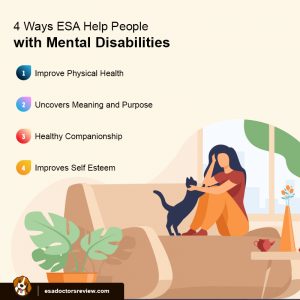If you have owned a pet or pets before, you understand that they are among the best source of company, especially when feeling unwell or down. This explains why Americans own approximately 78 million dogs and nearly 86 million cats.
Apart from providing comfort, pets play a significant role for those struggling with mental illnesses and disabilities. Emotional Support Animals are a source of emotional support with positively proven outcomes.
Just click away and read some positive ESA letter provider reviews.
What is Emotional Support Animal Rehabilitation?
There are a lot of unknown facts surrounding Emotional Support Animal rehabilitation. To begin, Emotional Support Animal rehabilitation is the use of Emotional Support Animals to provide therapeutic benefits and alleviate symptoms of a mental and emotional disability.
Unlike service animals, Emotional Support Animals do not require much training, as they don’t need to perform specific tasks.
These animals provide comfort and companionship, helping affected individuals alleviate some aspect of their mental disorder. They help owners accomplish major daily living activities, such as caring, sleeping, walking, working, and other daily activities.
That said, dogs are the common type of Emotional Support Animals prescribed. However, cats, miniature horses, and other animals can also be used.
Who Qualifies for Emotional Support Animal Rehabilitation?
An estimated 18% of adults in America live with some type of mental and emotional disability. Most of these individuals can benefit from Emotional Support Animal rehabilitation. However, the majority are not aware that they can qualify.

Mental health professionals can prescribe Emotional Support Animals to those living with mental illnesses and disabilities. These include patients suffering from anxiety, depression, post-traumatic stress disorder, autism spectrum disorders, and ADHD.
Is Emotional Support Animal Rehabilitation Effective?
Over time, Emotional Support Animals have proven effective in helping patients with emotional disabilities improve their symptoms. These animals have been proven effective in helping patients with anxiety and depression in the following ways.
1. Improve Physical Health
Physical wellness has a significant impact on emotional wellbeing. Conclusions from a research study done by Harvard University suggested that petting a dog can decrease blood pressure.
Dog ownership has also been connected to lowered triglyceride levels. For instance, the act of walking a dog also boosts physical activity, which leads to increased endorphin or feel-good-hormone production. This helps create a stress-free physical environment that decreases symptoms of depression.
You must read honest reviews about any ESA clinic that helped people get an ESA Letter.
2. Uncovers Meaning and Purpose
One of the major symptoms of anxiety and depression is social detachment. Most patients feel isolated and lack purpose in life. As such, Emotional Support Animals can provide company and unconditional love to isolated patients.
Knowing that a pet relies on you for food and other provisions develops a sense of purpose, even in patients with mental conditions.
3. Healthy Companionship
As mentioned, individuals with emotional and mental disabilities often struggle to maintain healthy relationships with other people. During such experiences, Emotional Support Animals provide a genuinely safe and loving company.
Moreover, those suffering from depression don’t need to fake a front when spending time with their animals. As they would have to when with other humans. They can be themselves all the time without feeling judged.

4. Improves Self Esteem
Those struggling with depression often have issues with their self-esteem and prone to frequent episodes of anxiety. Emotional Support Animals can improve all these symptoms, improving one’s quality of life. A study done at Miami University by McConnell proved that pet owners comparably have high self-esteem and low fearful levels. This proves that Emotional Support Animal rehabilitation can help decrease depressive symptoms and improve the overall quality of life in individuals with mental illnesses.
How Does Emotional Support Animals Provide Support?
Emotional Support Animals’ mechanism of action cannot be compared to drugs and other therapies aimed at improving mental conditions. These animals provide this support by simply being there for their owners.
They are an important source of unconditional love and companionship, which is overly important for those with mental disabilities.
Mentally affected individuals develop a sense of responsibility and purpose by taking care of these animals. Feeding, walking, bathing, talking, and taking general care of these animals makes one feel important and valuable. Such is important for those struggling with anxiety and depression, as they might feel less of their self-worth.
While Emotional Support Animals cannot talk back, these animals are excellent listeners. Furthermore, unlike humans, they are not judgmental and great at keeping secrets.
They provide a great place to confide in, which helps affected individuals work through their mental problems.
ESAs also provide great support when their owners face difficult situations. For instance, they provide company to individuals who develop anxiety when traveling. They help owners feel confident in anxiety-inducing situations.
ESA will change your life. Read reviews for ESA clinics that helped people on the road to better mental health.
Bottom Line
Emotional Support Animals can be beneficial to millions of mentally challenged persons. If you suffer from any of these conditions and think that Emotional Support Animals will help alleviate your symptoms, you can apply for an ESA prescription letter.
You can contact ESA Doctors to find the closest licensed mental health professional close to you. Just click on the link below!








